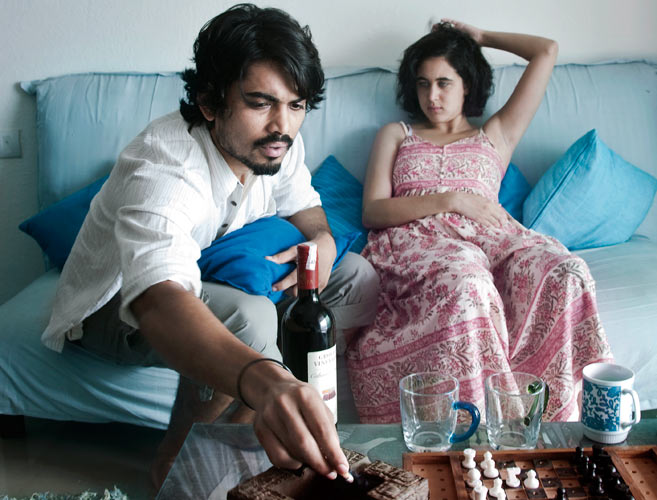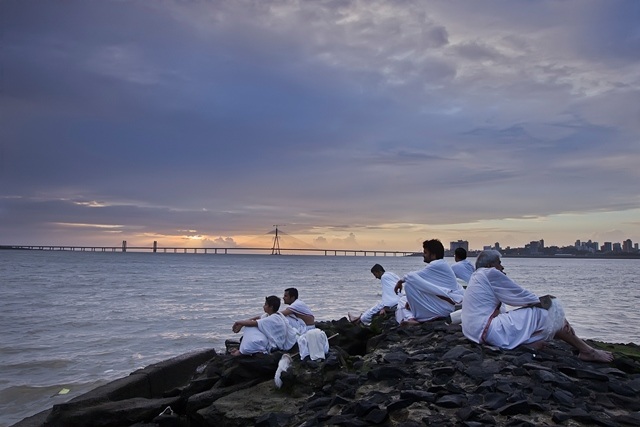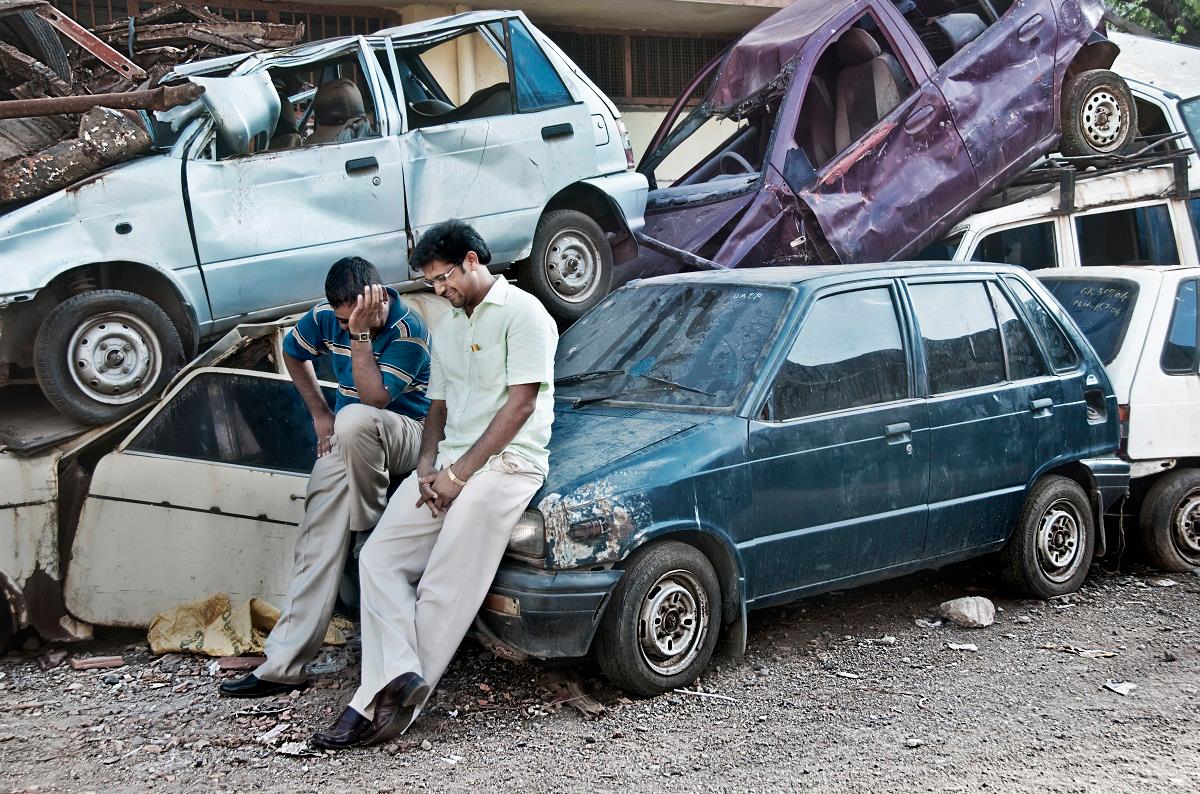‘Ship of Theseus’ is an overwhelmingly meditative experience- at an emotional, intellectual, ideological and philosophical level – complete indulgence in which assures cinematic nirvana. The unflinching conviction of the theme’s dilemma required assured, sensible hands for execution, and debutante director Anand Gandhi offers just that. The main paradox of the subject proposes a doubt that whether an object (in this case a ship), which has all its constituent parts replaced, remains in essence the same?- philosophy of which seeks an answer to whether we remain the same over the course of a lifetime, or how much we change, and whether the very essence of us changes?

This contemplative story has its stage set in Mumbai, and traces three separate threads of lives and ideologies. Firstly, we’re introduced to Aaliya (Aida El-Kashef), a blind Egyptian photographer who depends on her intuition and to capture colors on the photo-frame. That’s her uniqueness, which kindles both passion and doubt- most wonderfully demonstrated in a scene where a journalist is interviewing her, and later in the animated discussion with her Indian boyfriend who believes that an accidental picture is wonderful and she wishes to dispose of. Aaliya just won’t give up her control over the art, and the bless of vision is just no reason enough to void her judgment. Her eyesight is restored, but the spontaneity and expressiveness that her earlier photographs possessed is now lost.

Next we’re introduced to a learned Jain monk named Maitreya (Neeraj Kabi- simply brilliant!), who’s against pharmaceutical and cosmetic products even though he’s been diagnosed with liver cirrhosis- sole reason being the initial animal abuse following which the medicines are okayed for human use. His treatment may demand of him a liver transplant, but he doesn’t avail this alternative and resolves to end his life. A stern test of faith and will-power, indeed. A lawyer Charwaka (Vinay Skukla) disapproves of his decision stating that this deed of his won’t be relevant in the bigger scheme of the world, to which the monk retorts to Butterfly Effect- that even a small action somewhere may affect the opposite end of the universe. But at the last stages of his life, he just ask for the doctor. Does he? There is a particular scene with grass dancing on the breeze’s tunes, just before the end of this segment in the film. Loved that metaphor!

Then we’ve Naveen (Sohum Shah), a young dollar-headed stockbroker who’s recently had a kidney transplant. Naveen’s grandmother is a social worker, whose fixation with ’causes’ he finds unproductive. But a cause he gets, and it’s in his quest of helping a poor man with a stolen kidney that he truly discovers himself, and understands the deeper notions of morality and self-responsibility. Naveen’s colloquy with his grandmother- where he sticks to ‘ignorance is bliss’, and his heartfelt talk about right and wrongs with his friend is what elevates the article of faith in this story.
The only common attribute among these protagonists- they’ve encountered the concept of organ transplantation.
This film heralds a new cinematic era, is profoundly sketched and stays faithful to its ethos, and having deplumed uncommon stories from the common men’s lives, this connects instantly with the audience. The contradictory arguments peppered throughout the film add to its appeal. Also, the unhurried pace with which the film orgasms into its final meaning is haunting. The film stays clear of unwarranted dramatics, and never sails the commercial tide once. The spirited city of Mumbai seamlessly floats in the background, as if relishing a poem written in its honor. The city looks its most beautiful ever! As for the actors, they make us mull over their character’s minds, and you know the characters just long enough to know that somewhere something inside them has changed. As for cinematography, Pankaj Kumar deserves a salute. He’s beautifully captured every aspect, every component of the ‘ship’ we’re sailing in, and has aesthetically textured them with such subtlety that it just elevates the overall realism. Common accessible places -like the hospital, slum, the house – are beautifully shown. Composers Naren Chandavarkar and Benedict Taylor have created songs that gently embrace the narrative. ‘Naham Janami’ is inspiringly beautiful. The crisp editing maintains the charm. Also the heavy dialogues are well written and beautifully delivered. Anand Gandhi deserves all appreciation coming his way, for not only has he emerged as a thinking, philosophical director in this day and age, but also he’s emerged as a rebel who’s discarded the usual norms one sticks to while making a Bollywood movie. And having said that, I must add that a rebel’s arrogance is not what runs this boat, but a film-maker’s passion. Agreed that there exist a few creative flaws even in this film, but for the satisfaction and ecstasy of having watched this kind of a cinema supersedes all that. Sheer magic.
For being one of the best contemplative cinemas coming off the Indian shore, I’ll recommend this as a ‘must watch’. Do climb aboard this gem of a ship, for you definitely won’t be disappointed.
Rating: 5/5
‘Ship of Theseus’ is an overwhelmingly meditative experience- at an emotional, intellectual, ideological and philosophical level – complete indulgence in which assures cinematic nirvana. The unflinching conviction of the theme’s dilemma required assured, sensible hands for execution, and debutante director Anand Gandhi offers just that. The main paradox of the subject proposes a doubt that whether an object (in this case a ship), which has all its constituent parts replaced, remains in essence the same?- philosophy of which seeks an answer to whether we remain the same over the course of a lifetime, or how much we change, and whether the very essence of us changes?
This contemplative story has its stage set in Mumbai, and traces three separate threads of lives and ideologies. Firstly, we’re introduced to Aaliya (Aida El-Kashef), a blind Egyptian photographer who depends on her intuition and to capture colors on the photo-frame. That’s her uniqueness, which kindles both passion and doubt- most wonderfully demonstrated in a scene where a journalist is interviewing her, and later in the animated discussion with her Indian boyfriend who believes that an accidental picture is wonderful and she wishes to dispose of. Aaliya just won’t give up her control over the art, and the bless of vision is just no reason enough to void her judgment. Her eyesight is restored, but the spontaneity and expressiveness that her earlier photographs possessed is now lost.
Next we’re introduced to a learned Jain monk named Maitreya (Neeraj Kabi- simply brilliant!), who’s against pharmaceutical and cosmetic products even though he’s been diagnosed with liver cirrhosis- sole reason being the initial animal abuse following which the medicines are okayed for human use. His treatment may demand of him a liver transplant, but he doesn’t avail this alternative and resolves to end his life. A stern test of faith and will-power, indeed. A lawyer Charwaka (Vinay Skukla) disapproves of his decision stating that this deed of his won’t be relevant in the bigger scheme of the world, to which the monk retorts to Butterfly Effect- that even a small action somewhere may affect the opposite end of the universe. But at the last stages of his life, he just ask for the doctor. Does he? There is a particular scene with grass dancing on the breeze’s tunes, just before the end of this segment in the film. Loved that metaphor!
Then we’ve Naveen (Sohum Shah), a young dollar-headed stockbroker who’s recently had a kidney transplant. Naveen’s grandmother is a social worker, whose fixation with ’causes’ he finds unproductive. But a cause he gets, and it’s in his quest of helping a poor man with a stolen kidney that he truly discovers himself, and understands the deeper notions of morality and self-responsibility. Naveen’s colloquy with his grandmother- where he sticks to ‘ignorance is bliss’, and his heartfelt talk about right and wrongs with his friend is what elevates the article of faith in this story.
The only common attribute among these protagonists- they’ve encountered the concept of organ transplantation.
This film heralds a new cinematic era, is profoundly sketched and stays faithful to its ethos, and having deplumed uncommon stories from the common men’s lives, this connects instantly with the audience. The contradictory arguments peppered throughout the film add to its appeal. Also, the unhurried pace with which the film orgasms into its final meaning is haunting. The film stays clear of unwarranted dramatics, and never sails the commercial tide once. The spirited city of Mumbai seamlessly floats in the background, as if relishing a poem written in its honor. The city looks its most beautiful ever! As for the actors, they make us mull over their character’s minds, and you know the characters just long enough to know that somewhere something inside them has changed. As for cinematography, Pankaj Kumar deserves a salute. He’s beautifully captured every aspect, every component of the ‘ship’ we’re sailing in, and has aesthetically textured them with such subtlety that it just elevates the overall realism. Common accessible places -like the hospital, slum, the house – are beautifully shown. Composers Naren Chandavarkar and Benedict Taylor have created songs that gently embrace the narrative. ‘Naham Janami’ is inspiringly beautiful. The crisp editing maintains the charm. Also the heavy dialogues are well written and beautifully delivered. Anand Gandhi deserves all appreciation coming his way, for not only has he emerged as a thinking, philosophical director in this day and age, but also he’s emerged as a rebel who’s discarded the usual norms one sticks to while making a Bollywood movie. And having said that, I must add that a rebel’s arrogance is not what runs this boat, but a film-maker’s passion. Agreed that there exist a few creative flaws even in this film, but for the satisfaction and ecstasy of having watched this kind of a cinema supersedes all that. Sheer magic.
For being one of the best contemplative cinemas coming off the Indian shore, I’ll recommend this as a ‘must watch’. Do climb aboard this gem of a ship, for you definitely won’t be disappointed.
Rating: 5/5